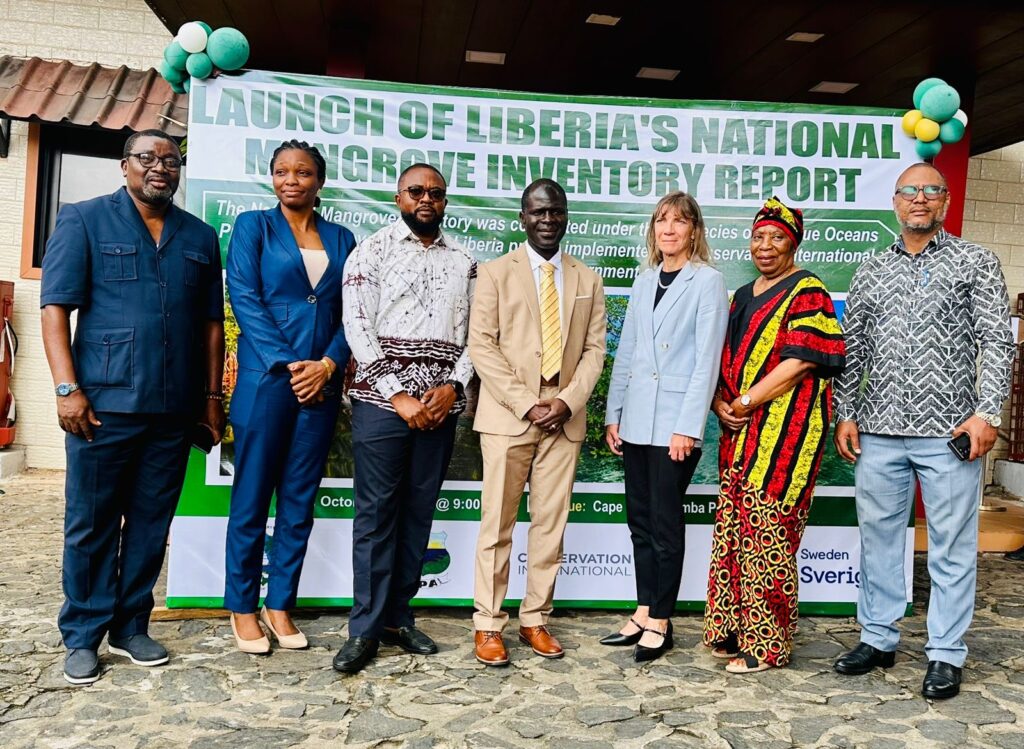By: Aaron Kubahn
MONROVIA, Liberia – The Environmental Protection Agency (EPA), in partnership with Conservation International (CI) Liberia, has launched the country’s first-ever National Mangrove Inventory, a groundbreaking initiative under the Blue Ocean Program that seeks to protect Liberia’s coastal and marine ecosystems and promote sustainable economic growth.
The launch, held on Tuesday, October 28, in Monrovia, was hailed by officials and development partners as a milestone in Liberia’s environmental stewardship and blue economy advancement.
Partners Laud Liberia’s Environmental Leadership
Delivering remarks, Valentine Ebua, Conservation International’s Managing Director for West and Central Africa, commended the partnership and urged the government to translate the inventory’s findings into concrete policies, including the creation of protected mangrove zones.
Madam Kerstin Jousson Cisse, representing the Swedish Embassy, applauded Liberia for achieving what she described as a “landmark milestone” under the Blue Ocean Program, which began at the 2019 Blue Oceans Conference. She praised Liberian experts, particularly those from the University of Liberia, for leading the scientific work behind the project.
“We are pleased to see Liberia taking full ownership of this process,” Madam Cisse stated. “Sweden remains committed to supporting Liberia’s development and environmental sustainability.”
EPA Boss Ties Mangrove Conservation to National Growth
Representing the Liberian government, EPA Executive Director Dr. Emmanuel King Urey Yarkpawolo emphasized that the mangrove inventory goes beyond environmental preservation—it is a pillar for sustainable economic transformation.
“Liberia’s Blue Economy strategy envisions using our ocean and river resources for fisheries, tourism, and renewable energy,” he said. “Healthy mangroves are the backbone of this vision—they protect our coastlines, provide livelihoods, and enhance food security.”
Dr. Yarkpawolo added that preserving mangroves is key to establishing a credible carbon market that benefits local communities. “Strong wetland protection supports our ability to generate verifiable carbon credits,” he noted, referencing Liberia’s National Carbon Market Policy.
Call for Partner Support and Action
The EPA head revealed that a US$3.2 million national budget framework has been developed to curb mangrove and wetland degradation through community restoration, law enforcement, research, and the establishment of a national mangrove park.
“We are appealing to our partners—the EU, Sweden, the World Bank, UNDP, and others—to help us fully implement this vision,” he said.
Dr. Yarkpawolo expressed gratitude to the Government of Sweden for its long-term support through the Blue Oceans Programme and to Conservation International for providing technical leadership.
“This inventory is not just a document—it is a call to collective action,” he stressed. “Our goal is to leave behind a coastline that is productive, resilient, and full of life.”
He reaffirmed President Joseph Nyuma Boakai’s commitment to making Liberia a regional model in Blue Economy development.
Advancing the President’s Environmental Agenda
Dr. Yarkpawolo recalled Executive Order No. 143, issued by President Boakai in 2024, which declared the protection and restoration of all wetlands a national priority and recognized mangroves as vital to biodiversity and climate resilience.
Following the order, the EPA established a National Wetlands Task Force to map wetland boundaries, assess threats, and promote community-led restoration. The new mangrove inventory, he said, will provide real-time data on mangrove coverage, condition, and carbon capacity—critical for national planning and investment.
Charting a Sustainable Coastal Future
With the completion of its first National Mangrove Inventory, Liberia is better positioned to safeguard its coastal ecosystems, enhance climate resilience, and unlock new opportunities in the Blue Economy.
“With sound science, effective partnerships, and continuous investment,” Dr. Yarkpawolo concluded, “Liberia can lead West Africa in sustainable coastal and ocean management.”


